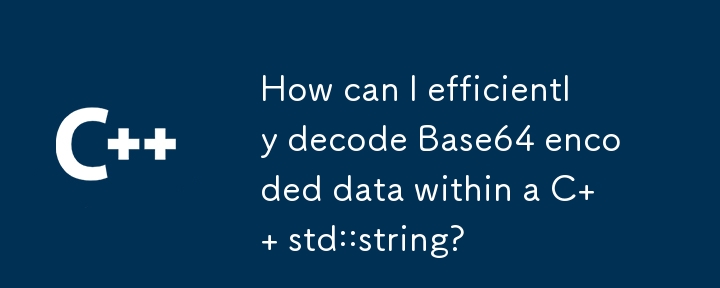

Lorsque vous travaillez avec des données stockées au format binaire dans un objet std::string, vous pouvez rencontrer le besoin de décodage Base64. Cet extrait propose une solution spécialement conçue pour de tels scénarios.
Le code suivant fournit à la fois l'encodage et le décodage Base64. fonctionnalité :
base64.h :
#ifndef _BASE64_H_ #define _BASE64_H_ #include <vector> #include <string> typedef unsigned char BYTE; std::string base64_encode(BYTE const* buf, unsigned int bufLen); std::vector<BYTE> base64_decode(std::string const&); #endif
base64.cpp :
#include "base64.h"
#include <iostream>
static const std::string base64_chars =
"ABCDEFGHIJKLMNOPQRSTUVWXYZ"
"abcdefghijklmnopqrstuvwxyz"
"0123456789+/";
static inline bool is_base64(BYTE c) {
return (isalnum(c) || (c == '+') || (c == '/'));
}
std::string base64_encode(BYTE const* buf, unsigned int bufLen) {
std::string ret;
int i = 0;
int j = 0;
BYTE char_array_3[3];
BYTE char_array_4[4];
while (bufLen--) {
char_array_3[i++] = *(buf++);
if (i == 3) {
char_array_4[0] = (char_array_3[0] & 0xfc) >> 2;
char_array_4[1] = ((char_array_3[0] & 0x03) << 4) + ((char_array_3[1] & 0xf0) >> 4);
char_array_4[2] = ((char_array_3[1] & 0x0f) << 2) + ((char_array_3[2] & 0xc0) >> 6);
char_array_4[3] = char_array_3[2] & 0x3f;
for(i = 0; (i <4) ; i++)
ret += base64_chars[char_array_4[i]];
i = 0;
}
}
if (i)
{
for(j = i; j < 3; j++)
char_array_3[j] = '<pre class="brush:php;toolbar:false">std::vector<BYTE> myData;
...
std::string encodedData = base64_encode(&myData[0], myData.size());
std::vector<BYTE> decodedData = base64_decode(encodedData);Pour démontrer l'utilisation de cet extrait, considérez le suivant :
Ce qui précède est le contenu détaillé de. pour plus d'informations, suivez d'autres articles connexes sur le site Web de PHP en chinois!
 Que signifie le wifi désactivé ?
Que signifie le wifi désactivé ?
 Comment créer un wifi virtuel dans Win7
Comment créer un wifi virtuel dans Win7
 Client Bitcoin
Client Bitcoin
 Que dois-je faire si la vidéo Web ne peut pas être ouverte ?
Que dois-je faire si la vidéo Web ne peut pas être ouverte ?
 Quel logiciel est premier
Quel logiciel est premier
 Désactivez les mises à jour automatiques de Win10
Désactivez les mises à jour automatiques de Win10
 Comment acheter du Bitcoin
Comment acheter du Bitcoin
 Formule de la loi de conservation de l'énergie mécanique
Formule de la loi de conservation de l'énergie mécanique